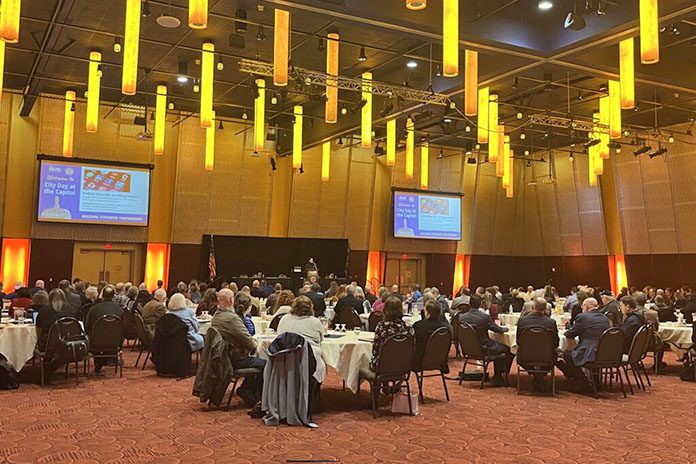
By Julia Shumway
Hundreds of mayors – including Hermiston Mayor Dave Drotzmann – along with city councilors and city employees from around Oregon descended on Salem on Wednesday to lobby lawmakers for hundreds of millions of dollars for homelessness and housing shortages.
Local leaders are pushing a proposal from the Oregon Mayors Association for nearly $125 million in annual funding for cities to address homelessness. They face a tough sell in Salem, where Gov. Tina Kotek has expressed skepticism about a proposal for per capita funding and lawmakers have less money to allocate than they did in previous years.
Teri Lanahan, the mayor of North Plains and president of the Oregon Mayors Association, argued during a press conference at the Salem Convention Center that giving money directly to cities was the best way to address Oregon’s homelessness crisis. Lanahan said she knows personally who is homeless in her roughly 3,500-population Washington County suburb, and she thinks other Oregon mayors could say the same.
“Cities are on the front line,” Lanahan said. “We are closest to the issue and we are uniquely equipped to address it.”
The proposal calls for nearly $125 million annually in ongoing funding, with each city receiving $40 per resident. All 241 incorporated cities would receive a minimum of $50,000 – Oregon’s smallest incorporated city, Greenhorn in Baker County, has just three residents, according to the state’s demographers at Portland State University. At least six other cities have fewer than 100 residents, and dozens more are home to fewer than 1,000 people.
“Many communities are struggling to make ends meet the needs of their residents by virtually non-existent budgets,” Lanahan said. “For example, the city of Powers, population of just about 700, would spend $50,000 just on cleanup and code enforcement alone. (It) doesn’t sound like much, but it is a lot of money for a small city’s budget.”
Along with $125 million in ongoing funding, Oregon cities are asking for another $150 million in one-time funding to build homeless shelters and navigation centers, which help homeless people connect with resources.

The cities’ proposal doesn’t include clear metrics for how to gauge if programs are working or if money is being used efficiently. Hermiston Mayor Dave Drotzmann, the vice president of the League of Oregon Cities, said cities know better than state agencies how to use money to best serve their communities.
“I respect each city’s ability to use those things to the best benefit of the constituents that they’re intended to use those for,” he said. “We currently do that with all our other services.”
Their requests come as Oregon lawmakers face a likely budget shortfall. Legislative budget analysts in December said the state is going to have a $560 million gap between the amount of money needed to continue funding current programs during the next two-year budget cycle and the amount the state expects to receive. Lawmakers will receive updated revenue forecasts in February and April.
Senate President Rob Wagner, D-Lake Oswego, told the local elected officials he’s started demonstrating the difficulty of budgeting with a bucket of marbles representing the roughly $35 billion available to spend. Increasing funding for housing, which lawmakers and Kotek agree is a top priority, means less money is available for other needs.
“It’s going to be a tough budget cycle,” Wagner said. “You’re seeing in your communities. We’re feeling it at the state.”
Kotek has called for $130 million in funding to build more shelters, provide services to people living on the streets and prevent people from losing their homes, and more is likely to be included in the budget proposal she’ll submit to the Legislature by Feb. 1. She has said that limited state money should go to programs that have proven successful, such as expanding the Project Turnkey initiative that resulted in nearly 900 new shelter beds with $75 million in state funding.
Kotek planned to meet with members of the mayors association on Wednesday. She told the group of local officials attending the lobbying day event hosted by the League of Oregon Cities that she intended to work with local leaders to address homelessness as a statewide issue.
“We have homelessness around our state – it looks a little different in every community, but it is there,” she said. “We have a housing supply issue in every corner of our state, and so we need to take both of those issues on with the urgency that they demand. And my pledge to you is that we will be doing this together.”
Local officials are seeking flexibility in how they could use money earmarked for homelessness, including cleaning up homeless camps, building shelters or affordable housing, paying outreach workers and providing services including food assistance and hygiene stations.
Rainier City Councilor Scott Cooper said homelessness in his small city on the south bank of the Columbia River has manifested itself through abandoned recreational vehicles and derelict boats. The city needs to use money intended for homelessness to deal with boats repurposed as floating homeless camps, Cooper said.
“We have a marina,” Cooper said. “Most cities don’t have a marina. A single boat sinking in the marina, nobody wants to tow it, and if they do, they definitely aren’t doing it for cheap. That comes out of our general fund, and we can only do that so many times.”
This story was first published in the Oregon Capital Chronicle.










